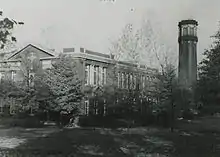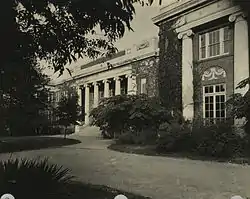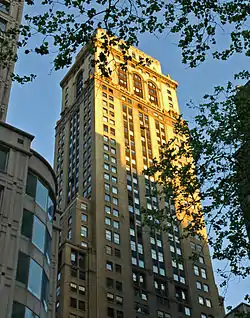Ludlow and Peabody was an American architectural firm with offices in New York City formed by partners Charles S. Peabody and William Orr Ludlow in 1909. The firm continued in practice under that name until 1935.[1]
Peabody graduated from Harvard in 1903, studied architecture at Columbia University, then attended the Ecole des Beaux-Arts, from which he graduated second in his class of 300 in 1908. He became a member of the American Institute of Architects in 1916.[2][3][4]
Ludlow earned a degree in mechanical engineering at Stevens Institute of Technology in 1892. He then worked as a draftsman in the office of Carrère and Hastings[4] from 1892 to 1895. He was a member of the firm Ludlow and Valentine until 1909. Ludlow was a member of the American Institute of Architects (AIA) and the New Jersey Society of Architects.[1] Independently or with associates Ludlow was responsible for the design of forty college or university buildings, thirty churches, banks, hospitals, residences, and other buildings, totaling over four hundred commissions in all.[2]
Among the works of Ludlow and Peabody are:
Works
| Building Name | Floors | Year |
|---|---|---|
| Sheldon Jackson College campus (5 buildings) Sitka, Alaska [4](NRHP) | 1910 | |
| Fort William Henry Hotel, Lake George, New York[5] (demolished) | 1911 | |
| Delaware and Hudson Passenger Station, Lake George, New York [5](NRHP) | 1911 | |
| Vanderbilt University/Peabody College: Jesup Psychological Laboratory, Nashville, Tennessee (NRHP) | 1914[6] | |
| Vanderbilt University/Peabody College: Industrial Arts building (Mayborn Hall), Nashville, Tennessee (NRHP) | 1914 | |
| Vanderbilt University/Peabody College: Home Economics Building, Nashville, Tennessee (NRHP) | 1914 | |
| Vanderbilt University/Peabody College: Social Religious building (Wyatt Center), Nashville, Tennessee (NRHP) | 1915 | |
| Saratoga Springs Visitor Center (The Drink Hall) [7] (NRHP) | 1915 | |
| Stevens Institute of Technology: William Hall Walker Gymnasium, Hoboken, New Jersey[8] (NRHP) | 2 + mezzanine | 1916 |
| Wiawaka Holiday House boat house, Lake George, New York [9] | 1917 | |
| Hampton Normal and Agricultural Institute campus buildings, Hampton, Virginia [10] (NRHP) | 1919 | |
| 229 West 43rd Street (formerly the New York Times Building) west side extension, New York, New York | 1922 | |
| 292 Madison Avenue (building expansion), New York, New York | 1923 | |
| 10 East 40th Street (formerly the Chase Tower), New York, New York [11] | 1929 |
Gallery
 Richard H. Allen Memorial Hall, Sheldon Jackson College
Richard H. Allen Memorial Hall, Sheldon Jackson College.tiff.jpg.webp) Fort William Henry Hotel, Lake George
Fort William Henry Hotel, Lake George Delaware and Hudson Railroad Passenger Station, Lake George
Delaware and Hudson Railroad Passenger Station, Lake George Industrial Arts Building, Peabody College
Industrial Arts Building, Peabody College Home Economics Building, Peabody College
Home Economics Building, Peabody College Social Religious Building, Peabody College
Social Religious Building, Peabody College Saratoga Springs Visitor Center
Saratoga Springs Visitor Center 10 East 40th Street, New York City
10 East 40th Street, New York City
References
- 1 2 "Ludlow, William Orr (1870 - ?) -- Philadelphia Architects and Buildings". www.baltimorebuildings.org. Retrieved 2016-05-09.
- 1 2 Tolles, Bryant Franklin (2003-01-01). Resort Hotels of the Adirondacks: The Architecture of a Summer Paradise, 1850-1950. UPNE. ISBN 9781584650966.
- ↑ "Charles S. Peabody". eng.archinform.net. Retrieved 2016-05-09.
- 1 2 3 "Sheldon Jackson College" in SAH Archipedia, eds. Gabrielle Esperdy and Karen Kingsley, Charlottesville: UVaP, 2012—, http://sah-archipedia.org/buildings/AK-01-SE045. Accessed 2016-05-09.
- 1 2 "DELAWARE & HUDSON PASSENGER STATION". www.nps.gov. Retrieved 2016-05-09.
- ↑ "1914 - Jesup Psychological Laboratory - Nashville, TN - Dated Buildings and Cornerstones". Waymarking.com. Retrieved 25 September 2017.
- ↑ "About The Building - Saratoga Springs Heritage Area Visitor Center". Saratoga Springs Heritage Area Visitor Center. Retrieved 2016-05-09.
- ↑ "The William Hall Walker Gymnasium". The American Architect. CXI (2156): 240. April 18, 1917.
- ↑ "The Wiawaka Project: Noted Architect Linked to Wiawaka". www.wiawakaproject.com. Retrieved 2016-05-09.
- ↑ Architectural Record. Record and Guide. 1919-01-01.
- ↑ "New York Architecture Photos: Mercantile Building". NewYorkitecture. 2015-02-23. Retrieved 2016-05-09.